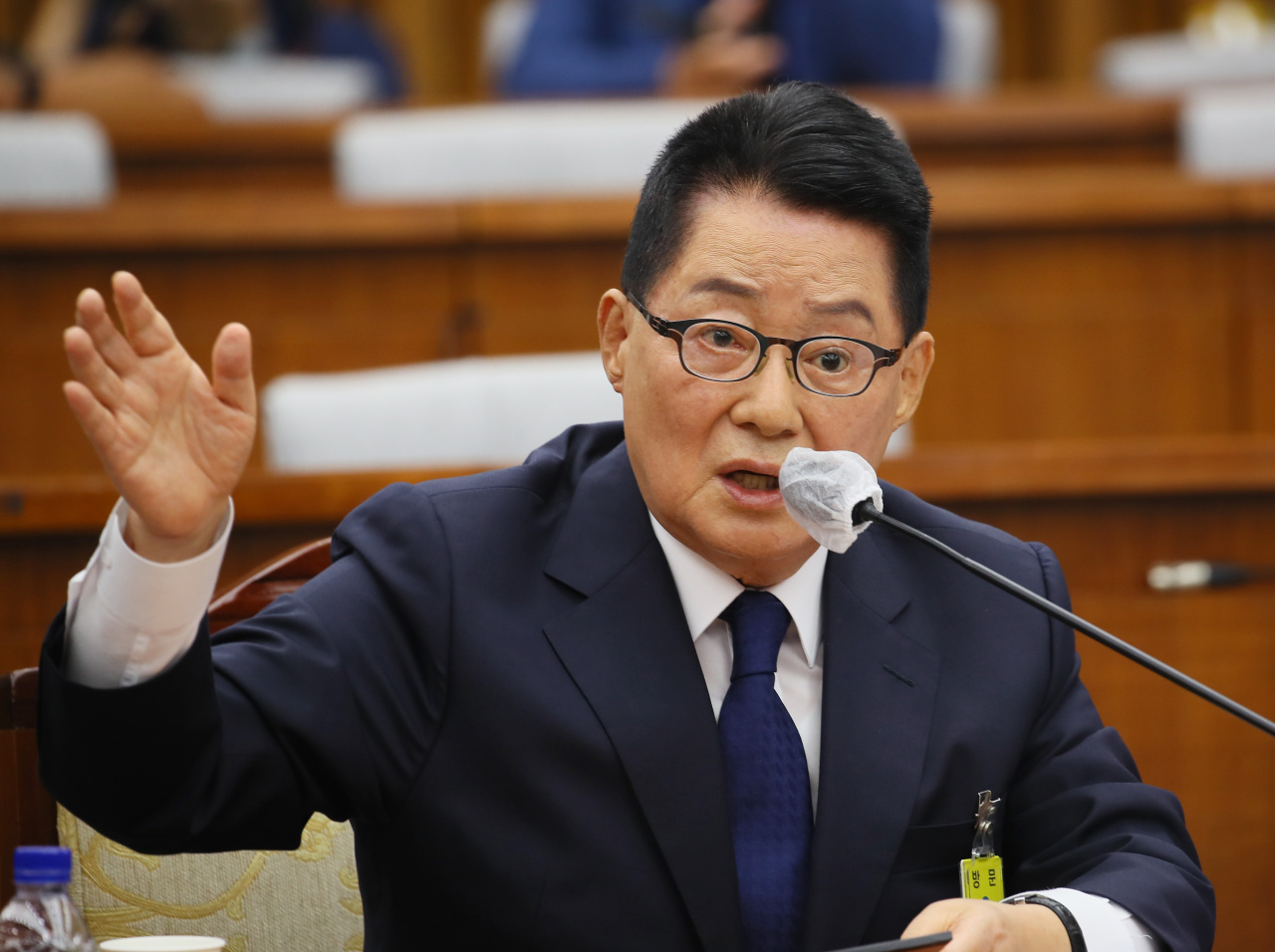Spy chief nominee draws fire over his role in 2000 inter-Korean summit, academic records
By Choi He-sukPublished : July 27, 2020 - 16:37

National Intelligence Service Director nominee Park Jie-won on Monday pledged to be “reborn” as a civil servant, while drawing heavy fire from the main opposition party over his involvement in illegal transfer of funds to North Korea in 2000.
Park is a former lawmaker who served four terms in the National Assembly between 1992 and 2020. Park has also served as a culture minister and was chief of staff to the president during the 1998 to 2003 Kim Dae-jung administration.
At Park’s confirmation hearing, the main opposition United Future Party honed in on his involvement in the transaction, and alleged irregularities in his academic records, which Park denied.
Ahead of the June 15, 2000 inter-Korean summit, Park served as a special envoy for South Korea. He was later found guilty of playing a part in illegally transferring $500 million to the North, though he was eventually pardoned.
“The Supreme Court ruling and the special counsel probe found that not $1 of the $500 million was government funds,” Park said. He added that it has been “historically and legally proven” that the money was paid by Hyundai Group to carry out projects in North Korea.
“The reason I served prison time is that an NIS account was used in the process of Hyundai transferring the money. To this day, I do not know what account was used to transfer the money to the North.”
United Future Party Floor Leader Rep. Joo Ho-young, however, pressed Park with an alleged copy of an inter-Korean agreement with Park’s signature.
“The agreement states that (Seoul) will provide $500 million from humanitarian principles,” Joo said, adding that the signature on the document is identical to that of Park.
Park, for his part, rejected the claims, and raised doubts about the process through which Joo acquired the document.
“(I) do not know how that document was acquired, but the April 8 agreement has been disclosed, and I have no memory of any other document that I signed,” Park said.
The “April 8 agreement” was to hold the inter-Korean summit in June, and was reached between Park and North Korean officials and signed on April 8, 2000.
At Monday’s hearing, Park also faced accusations that he forged his academic records to transfer to Dankook University in 1965.
Rep. Ha Tae-keung of the United Future Party raised allegations that Park had stated that he had graduated from Chosun University to transfer to Dankook University in 1965. Ha claims in 2000, when Park was serving as culture minister, Park pressured Dankook University to change the records to show that his transfer application indicated that he had graduated from Gwangju National University of Education.
Denying any irregularities in his academic records, Park has refused to provide related documents to the confirmation hearing committee.
Aside from allegations concerning his past, Park pledged to lead the NIS in a transparent manner and to ensure that the spy agency does not become involved in domestic politics. Park also said he plans to reorganize the NIS to strengthen the agency’s scientific investigation capabilities, and that he will disclose any evidence of the NIS being involved in the May 18 Gwangju Democratic Movement if such evidence is found.
By Choi He-suk (cheesuk@heraldcorp.com)







![[Graphic News] More Koreans say they plan long-distance trips this year](http://res.heraldm.com/phpwas/restmb_idxmake.php?idx=644&simg=/content/image/2024/04/17/20240417050828_0.gif&u=)
![[KH Explains] Hyundai's full hybrid edge to pay off amid slow transition to pure EVs](http://res.heraldm.com/phpwas/restmb_idxmake.php?idx=644&simg=/content/image/2024/04/18/20240418050645_0.jpg&u=20240419100350)






![[From the Scene] Monks, Buddhists hail return of remains of Buddhas](http://res.heraldm.com/phpwas/restmb_idxmake.php?idx=652&simg=/content/image/2024/04/19/20240419050617_0.jpg&u=20240419175937)

![[KH Explains] Hyundai's full hybrid edge to pay off amid slow transition to pure EVs](http://res.heraldm.com/phpwas/restmb_idxmake.php?idx=652&simg=/content/image/2024/04/18/20240418050645_0.jpg&u=20240419100350)

![[Today’s K-pop] Illit drops debut single remix](http://res.heraldm.com/phpwas/restmb_idxmake.php?idx=642&simg=/content/image/2024/04/19/20240419050612_0.jpg&u=)